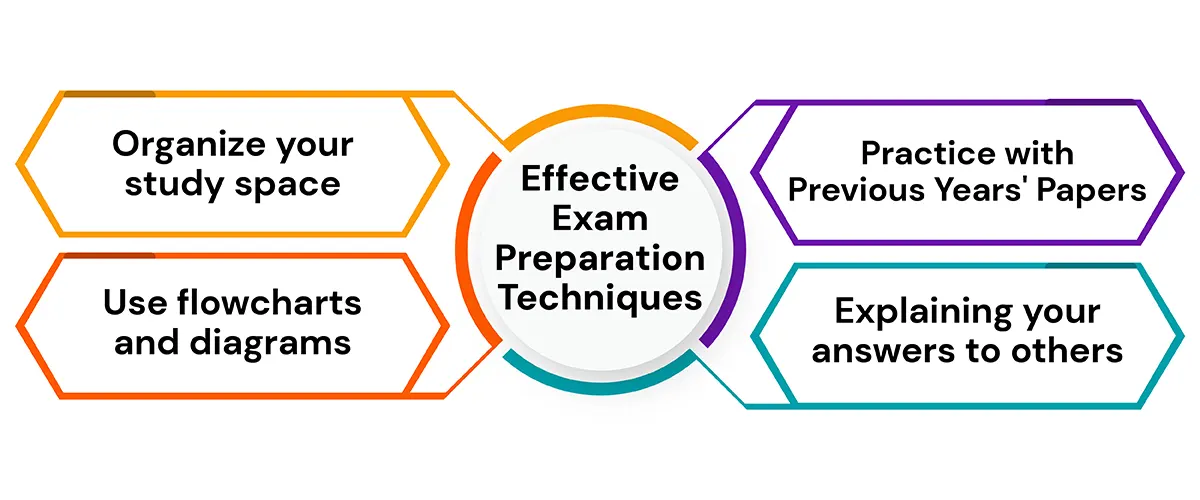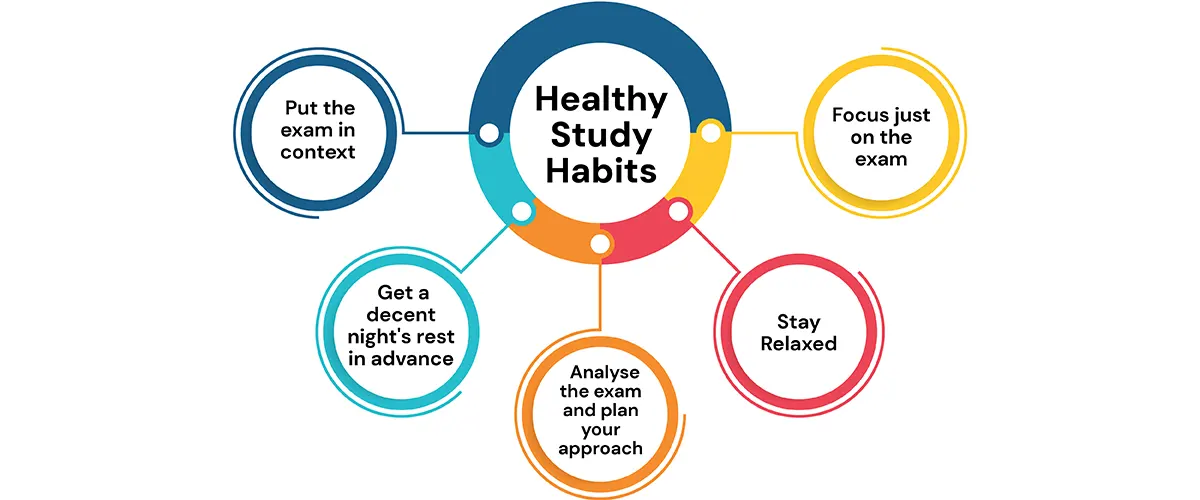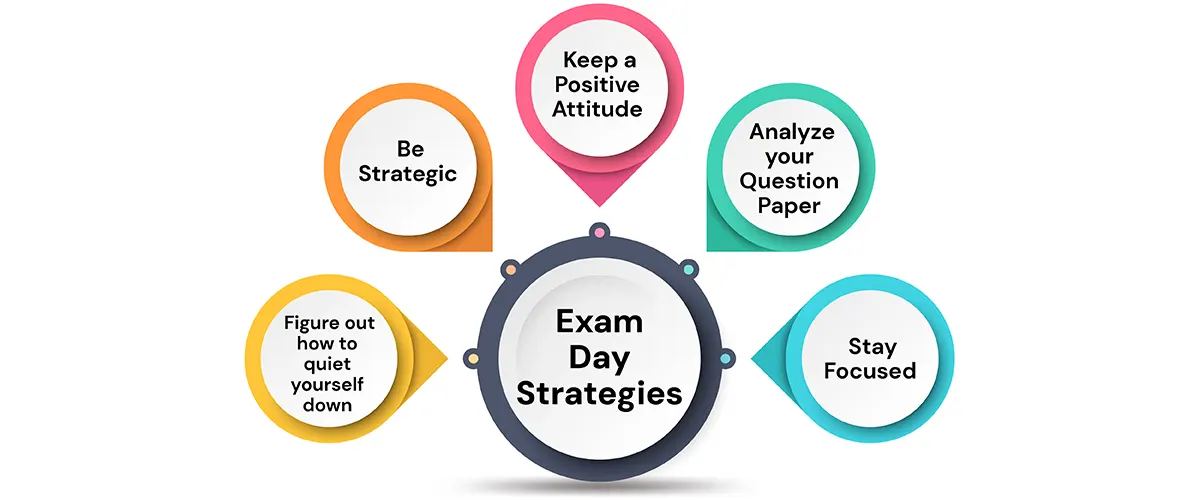The nerves you feel during exam season are regular, and to be perfectly candid, practical. The problem is that being excessively nervous could adversely influence your performance and lead to anxiety and panic during an exam.
Exams are an essential part of students’ lives, yet for some, they can welcome feelings of nervousness and stress. A common question asked by students and parents is how to stay calm during exam. The stress of performing well can be overpowering, and it’s not difficult to feel like everything is riding on this second.
Remaining mentally collected during exams is fundamental for performing at your best. In this article, we’ll talk about the significance of remaining calm during exams and give tips on how to stay calm during exams.
- ▪ Understanding Exam Stress
- ▪ Recognizing Personal Stress Triggers
- ▪ Effective Exam Preparation Techniques
- ▪ Time Management
- ▪ Healthy Study Habits
- ▪ How to Relax Before An Exam?
- ▪ Quick Stress-relief Exercises to Calm before an Exam
- ▪ Exam Day Strategies to Stay Calm
- ▪ Positive Affirmations
- ▪ FAQs on How to Stay Calm During Exams

Understanding Exam Stress
Exam stress for students often comes from a fear of the future. For students, there can be multiple sources such as meeting parents’ expectations, fear of the future, peer competition, etc. Exam stress can influence how we feel, think, and act. You could encounter various things previously, during, and after your exams.
Exams can be unpleasant all alone, however, different things could make you feel more stressed or anxious. These could include:
1. Feeling like you’re not prepared or ready for exams, such as delaying revision.
2. Stressing over how you’ll feel and perform during the exam, particularly when you don’t have the foggiest idea of what will be in it.
3. stress from people around you- parents, friends, teachers, neighbours, etc.
4. Higher expectations from yourself to get specific marks.
5. Constantly comparing yourself with others, such as expecting you to score under certain categories in any possible way.
6. Stressing over the future, such as getting into college.
7. Adapting to life changes, such as moving from school to university.
8. Experiencing issues at home or in your associations with family, or companions
There are multiple ways on how to stay calm during the exam. Before we delve into it, let us first understand the triggers of it.
Recognizing Personal Stress Triggers
Exam stress can be triggered for the overwhelming majority of various reasons. Knowing the triggers for your stress assists you in identifying the strategies.
Triggers can be put into 4 fundamental classifications:
1. Lifestyle issues
– Lacking rest
– Unfortunate nourishment
-Energizer use (e.g., caffeine, caffeinated drinks)
– Lacking activity
– Not planning accessible time
– Not focusing on responsibilities
2. Lack of Information
– Absence of effective strategies
– Absence of academic information (e.g., course prerequisites, teachers’ expectations, exam dates, and exam location)
– The absence of knowledge on the most proficient method to apply stress decrease strategies while considering, before an exam, and during an exam
3. Ineffective studying techniques
Inefficient techniques (e.g., incomplete content coverage, mindless cramming, binge studying)
Ineffective methods (e.g., reading without understanding, can’t remember the material, not making notes, not studying heartedly)
4. Psychological Factors
Losing control over the exam circumstances.
Negative reasoning and self-analysis; for instance:
- “I’m not adequately brilliant.”
- “I’ll get a bad grade.”
- “I won’t pass through the exams.”
- “I can’t do this.”
Effective Exam Preparation Techniques

The key how to stay calm during an exam is advanced preparation. Don’t wait until the last minute to prepare for the exam. Although some students seem to have no problem with last-minute cramming, it is generally agreed that this (for most people) is not the best way to approach an exam. To improve your time management, create a study timetable. Write down how many exams there are and when you have to take them. Then organize your learning accordingly. You may want to give some exams more study time than others, so find a balance that you’re happy with.
Some effective exam preparation techniques for how to stay calm during exams are as follows:
1. Organize your study space
Make sure you have enough space to spread out your textbooks and notebooks. Is there enough light? Is your chair comfortable?
Eliminate all distractions and make yourself as comfortable and focused as possible. For some people, this means almost complete silence, but for others, background music is helpful. Some of us need everything to be perfectly organized to focus, while others thrive in a more organized environment. Think about what works for you and take your time to find the right one.
2. Use flowcharts and diagrams
Visual aids are helpful during revision. When you start a topic, challenge yourself to write down everything you already know about the topic and mark where there are gaps. Shortly before the exam, compile your review notes into a one-page diagram. Recording your ideas in this short form will help you quickly remember everything you need to know during the exam.
3. Practice with Previous Years’ Papers
One of the most effective ways to prepare for the exam is to practice with older versions of the exam. This will help you become familiar with the format of the questions. It’s also a good exercise if you have time to make sure you’re spending the appropriate amount of time on each section.
4. Explaining your answers to others
Make good use of parents and other well-wishers. Please explain your answer to the question. This provides clarity and allows you to highlight areas that need further work.
Check: Last Minute Exam Revision Tips for Students
Time Management
Here are some tips for managing your time and how to stay calm during exams:
1. Stick to your timetable
The first step to managing your time during the exam is to create a timetable. A study plan will help you organize your time effectively and ensure you cover all the topics you need. First, identify the topics that need to be revised and what topics each topic needs to cover. Then, schedule specific times during your day to study each topic.
To avoid burnout, be sure to include breaks in your study schedule. Write down what you need to study and how much time you want to spend on each subject. This will help you stay on track and ensure you cover the entire fabric.
2. List tasks according to priority.
It’s important to prioritize your tasks. Focus on the topics that are most difficult for you, as they are likely to require the most time and effort.
Create a list of tasks that need to be completed and rank them in order of importance. This will help you manage your time more effectively and ensure you cover the most important topics first.
3. Use Calendar Notifications
Using notifications is a tool to help you manage your time during exams. Block out specific periods on your calendar and use that time to focus on studying.
When the timer runs out, take a break. This will help you stay focused, avoid distractions, and prevent burnout.
4. Eliminate distractions
Turn off your cell phone and other distracting devices. You can also use apps and browser extensions that block distracting websites and social media platforms.
5. Study during breaks and take breaks
Breaks are important for successful time management during exams. Make sure to take regular breaks throughout the day to relax and recharge.
Go for a walk, stretch, or just relax and meditate. This will help you maintain focus and energy while avoiding burnout.
6. Get enough rest
Adequate sleep is essential for successful time management during exams. Get at least 7 to 8 hours of sleep each night to stay alert and focused throughout the day.
Avoid studying late as it can disrupt your sleep and lead to burnout.
7. Stay Organized
Staying organized will also help you manage your time properly during the exam. Keep your study supplies organized and make sure you have everything you need before you start studying.
This saves you time searching for items and maximizes your study time.
Check: 7 Time Management Tips For Students
Healthy Study Habits

It’s human nature to feel less motivated and less focused, and it can get in the way of your learning goals.
Effective study habits have a positive impact. A consistent study routine will help you overcome problems such as poor time management that can hinder your progress.
Let’s have a look at the study habits on how to stay calm during exams.
1. Put the exam in context
It’s just an exam. The outcome isn’t an impression of who you are as an individual. On the off chance that you contribute a lot of your self-esteem in examinations and exams, it can create additional stress also, nervousness.
2. Get a decent night’s rest in advance
You actually should feel laid on the day of an exam. Indeed, even 4-5 hours might be sufficient. Creating your best work in the exam is hard assuming you’re feeling depleted.
3. Analyse the exam and plan your approach
Requiring a couple of moments to figure out how the marks are circulated for each question, how long to spend on each question, which question to begin with and so on., it is typically well-spent time.
4. Stay Relaxed
One sure-shot way of how to stay calm during exams is by practising breathing techniques. On the off chance that you’re feeling restless or are not thinking, stop, shut your eyes, and take a few full breaths. Focus just on your relaxing briefly or so and afterwards return to the exam paper. Requiring a moment to quiet yourself and pull together is time very much spent.
5. Focus just on the exam
Try not to sit around stressing, questioning yourself, considering how others are doing, and letting yourself know that you ought to have concentrated on more. Try not to contemplate what you ought to have done, focus on what you can do now. Tell yourself- “Right now, I’m going to concentrate on the exam.”
Check: 30 Tips on How to Study Smart
How to Relax Before An Exam?
The following are 5 tips on how to stay calm during exams.
1. Look forward
Try not to focus on the concepts you don’t know about. You won’t ever know it all, and it is alright. All the more critically, you can’t change the past however you have some control over what happens now and going ahead.
All things considered, centre around everything you do be aware. You will be amazed at exactly the amount you feel sure about! What’s more, utilize this certainty and information in your exam.
2. Take care of yourself
Get sufficient rest, eat well, and get some activity. These things will cause you to feel significantly better and thus, will assist you with keeping on track.
3. Be ready
Use revision strategies that are proficient and effective.
Cramming or reading endless pages of text probably won’t be the best utilization of your time. Instead, consider ways to visually convey the information.
4. Practice truly makes awesome
Knowing a great deal is just 50% of how you ought to plan for exams. Your exam procedure is additionally significant. Before the exam, practice as many past papers as you can. This will work on your insight and lift your certainty.
5. Focus on Mindfulness
Mindfulness incorporates unwinding and positive reasoning, the two of which will be vital to keeping you relaxed before and during an exam.
Check: 20 Proven Exam Study Hacks For Students
Quick Stress-relief Exercises to Calm before an Exam
Here are some quick stress-relief exercises for students that can be used at any time of exam preparation. It can be practised during preparation, entering before the exam hall, or even the night before the exam.
1. Find your Pace
In the event that you wind up racing through the questions, deliberately delayed down. Attempt and keep away from skim-perusing or looking over excessively fast.
2. Breathing Techniques
It’s generally expected to pause your breathing or inhale shallowly when apprehensive. Intentionally pause to inhale for 3 seconds and exhale for longer.
3. Check-in
Sometimes, check in with your posture and how your body is feeling. If you feel tense anyplace, change your posture, loosen up your shoulders, or stretch your arms. Assuming you are beginning to feel overpowered, make sure to profoundly relax.
4. Reset your state
If you start to feel physically uncomfortable, lose your focus, or start to panic, take a few moments to regulate your system both mentally and physically.
Exam Day Strategies to Stay Calm

The following are 5 tips to help you stay relaxed on the day of the exam:
1. Figure out how to quiet yourself down
At the point when in the exam, there are various things you can do to remain cool-headed.
If you’re anxious, close your eyes and take a deep breath. This will quiet you down. Keep in mind the power of positive thinking and keep telling yourself that you can accomplish this.
2. Be Strategic
Keep an eye on the clock, and put your strategy first. Perhaps start with certain simple questions to get ready. Or on the other hand, maybe you could begin with the harder ones or questions that merit the most stamps.
As time ticks on you might have to move your needs. To maximize your score in a time crunch, stick to the questions you are comfortable answering.
3. Keep a Positive Attitude
Instead of panicking because you can’t fully answer every question. Instead, concentrate on making use of the information you do have. You probably won’t get full checks, yet you will essentially get some.
Only your best will do. Try not to come down on yourself to accomplish more than that.
4. Analyze your Question Paper
If you are battling to get clarity on any question, make a few notes to brainstorm. Note ideas, highlight keywords, etc. Before you put pen to paper for your response, this will jog your memory.
5. Stay Focused
Don’t worry about what’s going on around you, what other people might be doing, or any other thoughts that might come to mind. Just stay focused. Remain fixed on yourself and your exam.
Check: How to Study One Day Before Exam?
Positive Affirmations
It’s not unexpected to feel anxious, stressed, or restless about exams. Rehearsing positive affirmations can be an extraordinary method on how to stay calm during exams.
Create affirmations for yourself using the following steps:
1. Use the pronoun “I” in the first person.
2. Pick works that cause you to feel empowered
3. Make affirmations part of your daily lives
Some affirmations that you can use during exam preparations:
“I can do this.”
“I’m quiet and centred.”
“I have focused and prepared well for the exams.”
“I know the concepts.”
“I have the strength and capability to achieve all of my dreams and goals,”
“My hard work always leads to success.”
“I’m thankful for where I am today.”
“I can solve difficult problems.”
“I’m trying my best and I’m pleased with what I have achieved.”
If you want to know how to calm yourself before an exam practice affirmations every day.
All in all, exam tension is a typical experience for a lot of students. Thus, it’s vital to supervise it to guarantee the most ideal exam preparation. Appropriate preparation levels, unwinding strategies, care, and positive self-talk can all support decreasing uneasiness levels. Maintaining a healthy way of life and looking for help when required is significant.
Recollect that feeling restless is ordinary, however there are ways of overseeing it. By carrying out the tips and steps in this blog, you can remain mentally collected and perform at your best during exams.
FAQs on How to Stay Calm During Exams
Q1. How do I stop stress and how to be relaxed before an exam?
To help you stay calm and confident right before and during the exam, perform relaxation techniques, such as deep breathing, relaxing your muscles one at a time, or closing your eyes and imagining a positive outcome. Don’t forget to eat and drink. Your brain needs fuel to function.
Q2. Is having stress good for scoring well in exams?
No, stress can play a catalyst to bad memory and brain fogginess. Try and replace stress with motivation to perform well in exams.
Q3. Does technology and social media play a key role in elevating stress or does it help to calm the stress down?
Technology and social media at times will only increase your stress as they instil a major fear of missing out and intimidation. You should reduce the limit of using social media, especially during exams.
Q4. Does waking up early help to prepare well for the exams?
Multiple studies have proved that waking up early helps to retain and understand concepts better. That being said, it is advised to stay aware of yourself and do what suits best for you individually.
Q5. What are some ways on how to relax before an exam?
Some tips to keep the nerves calm before or during exams are as follows:
1. Spend time with family and friends
2. Stay away from a negative environment
3. Take breaks to hydrate yourself and practice meditation

